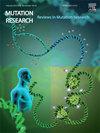PM2.5 induces lung inflammation through ANGPTL4
IF 1.5
4区 医学
Q4 BIOTECHNOLOGY & APPLIED MICROBIOLOGY
Mutation Research-Fundamental and Molecular Mechanisms of Mutagenesis
Pub Date : 2024-07-01
DOI:10.1016/j.mrfmmm.2024.111887
引用次数: 0
Abstract
Fine particulate matter (PM2.5) is a common major air pollutant associated with decreased lung function, induced allergic airway inflammation closely correlated with chronic lung diseases. Angiopoietin-like protein 4 (ANGPTL4) is a cytokine with multiple functions, participating in processes such as inflammation, angiogenesis, and metastasis. Curcumin is an active compound found in turmeric plants and possesses various pharmacological effects, including antioxidant, anti-inflammatory, anticancer, and immunomodulatory properties. The aim of this study was twofold: firstly, to investigate the involvement of ANGPTL4 in lung inflammation and carcinogenesis under PM2.5 exposure, and secondly, to explore the impact of curcumin on ANGPTL4 expression and its potential in lung cancer chemoprevention. We used protein array to detect several proinflammatory cytokines and then used qPCR to confirm by increasing the concentration of PM2.5 to enhance the expressions of CXCL1, CXCL5; IL-1α, IL-1β, MIP-3α and inflammation- or fibrosis-associated proteins. Curcumin inhibits PM2.5-induced ANGPTL4 and the IκB-α (inhibitor of NFκB)-dependent inflammatory pathway. Silencing ANGPTL4 by shRNA restore IκB-α and MIP-3α expression. In conclusion, the increased expression of ANGPTL4 after treatment with PM2.5 in lung cells may be one of the mechanisms by which PM2.5 exposure contributes to lung inflammation progression. Our results provide evidence that curcumin in anti-inflammation therapeutics could serve as a beneficial chemopreventive agent.
PM2.5通过ANGPTL4诱发肺部炎症
细颗粒物(PM2.5)是一种常见的主要空气污染物,与肺功能下降、诱发过敏性气道炎症和慢性肺部疾病密切相关。血管生成素样蛋白 4(ANGPTL4)是一种具有多种功能的细胞因子,参与炎症、血管生成和转移等过程。姜黄素是姜黄植物中的一种活性化合物,具有多种药理作用,包括抗氧化、抗炎、抗癌和免疫调节特性。本研究的目的有两个:第一,研究PM2.5暴露下ANGPTL4参与肺部炎症和癌变的情况;第二,探讨姜黄素对ANGPTL4表达的影响及其在肺癌化学预防中的潜力。我们用蛋白质阵列检测了几种促炎细胞因子,然后用qPCR证实了通过增加PM2.5的浓度来提高CXCL1、CXCL5、IL-1α、IL-1β、MIP-3α和炎症或纤维化相关蛋白的表达。姜黄素能抑制 PM2.5 诱导的 ANGPTL4 和 IκB-α(NFκB 抑制剂)依赖性炎症途径。通过 shRNA 沉默 ANGPTL4 可恢复 IκB-α 和 MIP-3α 的表达。总之,PM2.5处理后肺细胞中ANGPTL4的表达增加可能是PM2.5暴露导致肺部炎症进展的机制之一。我们的研究结果提供了证据,证明姜黄素在抗炎治疗中可作为一种有益的化学预防剂。
本文章由计算机程序翻译,如有差异,请以英文原文为准。
求助全文
约1分钟内获得全文
求助全文
来源期刊
CiteScore
4.90
自引率
0.00%
发文量
24
审稿时长
51 days
期刊介绍:
Mutation Research (MR) provides a platform for publishing all aspects of DNA mutations and epimutations, from basic evolutionary aspects to translational applications in genetic and epigenetic diagnostics and therapy. Mutations are defined as all possible alterations in DNA sequence and sequence organization, from point mutations to genome structural variation, chromosomal aberrations and aneuploidy. Epimutations are defined as alterations in the epigenome, i.e., changes in DNA methylation, histone modification and small regulatory RNAs.
MR publishes articles in the following areas:
Of special interest are basic mechanisms through which DNA damage and mutations impact development and differentiation, stem cell biology and cell fate in general, including various forms of cell death and cellular senescence.
The study of genome instability in human molecular epidemiology and in relation to complex phenotypes, such as human disease, is considered a growing area of importance.
Mechanisms of (epi)mutation induction, for example, during DNA repair, replication or recombination; novel methods of (epi)mutation detection, with a focus on ultra-high-throughput sequencing.
Landscape of somatic mutations and epimutations in cancer and aging.
Role of de novo mutations in human disease and aging; mutations in population genomics.
Interactions between mutations and epimutations.
The role of epimutations in chromatin structure and function.
Mitochondrial DNA mutations and their consequences in terms of human disease and aging.
Novel ways to generate mutations and epimutations in cell lines and animal models.

 求助内容:
求助内容: 应助结果提醒方式:
应助结果提醒方式:


